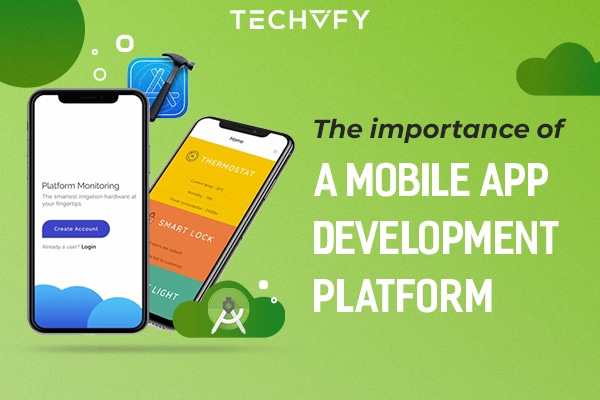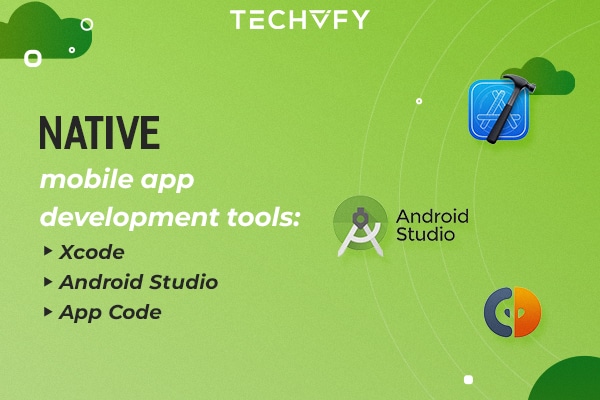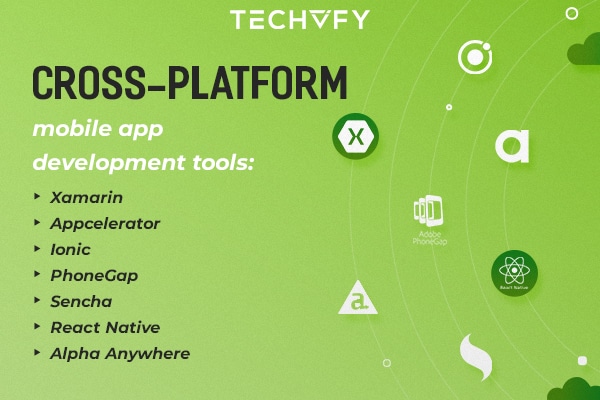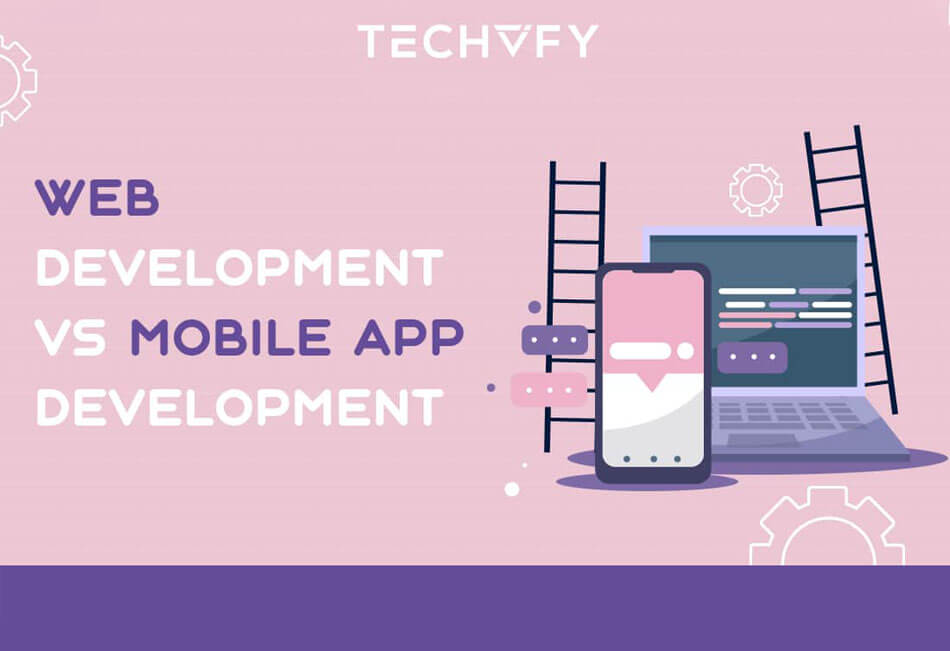[Top 10] Best Mobile App Development Platform in 2025
- David Ho
- April 15, 2021
- Knowledge, Best practices
- 0 Comments
I. What is a mobile app development platform?
A mobile app development platform is a type of software that allows businesses to build and test mobile apps for smartphones and tablets. It provides developers with an environment consisting of all the mobile app development tools needed to create an application. Many mobile app development platforms possess tools for mobile app testing, mobile app optimization, and mobile app debugging.
Mobile app development platforms have resembled features of integrated development environments (IDE) but are geared specifically toward mobile applications, mostly toward creating iOS or Android applications.
There are two types of mobile app development tools aiming at creating mobile applications on different platforms: Native mobile development tools and cross-platform mobile development tools.
- Native mobile app development tools help you create specialized apps that can take advantage of all features on their designated platform, easily operate, and perform effectively.
- Cross-platform mobile app development tools possess hybrid functionality and tools to create a generic app for multiple platforms simultaneously. This tool greatly cuts the costs and time needed to create an app, but it also comes with more issues and lower quality compared to native applications.

A business can independently create a mobile app, from e-commerce apps to games, by providing its developers with a platform to write, manage, and deploy mobile applications. However, companies can also buy one from a third-party vendor.
The mobile app development platforms that third-party vendors sell usually include features such as mobile backend as a service (BaaS), front-end development tools, and management tools for application programming interfaces (APIs).
A mobile app development platform may also provide native, web, and hybrid app development capabilities, as well as mobile application management (MAM) tools for deploying and securing apps.
II. Native mobile app development tools
1. Xcode
Xcode is a mobile app development platform that includes everything developers need to create applications for Mac, iPhone, iPad, Apple TV, and Apple Watch. Xcode provides mobile app developers with a comprehensive workflow from user interface design, coding, and testing, to debugging.
Swift is an innovative new programming language for Cocoa and Cocoa Touch. When combining Swift with Xcode tools makes the mobile app development process become a delightfully live experience.
2. Android Studio
Android Studio is the official Android mobile app development IDE based on IntelliJ IDEA. It was built by Google and had a very useful implementation editor for Android developers.
Android Studio provides shortcuts for coding and designing with a very user-friendly layout designer, which reduces coding time. Furthermore, Android Studio also provides drag-and-drop features to design the layout of your projects.
3. AppCode
AppCode is an IDE for iOS/macOS mobile app development platform. In addition to working with Objective-C, Swift, and C/C++ programming languages, it supports web technologies such as JavaScript, HTML, XML, CSS, and more. AppCode provides a variety of valuable integrations, including other CocoaPods managers and built-in Reveal support.
AppCode mobile app development platform provides significant advantages to mobile app developers. It is beneficial in saving their time on automating routine tasks, locating and fixing errors, taking advantage of intelligent support from the IDE, and increasing their overall productivity.

Cross-platform mobile app development tools
4. Xamarin
Xamarin is a mobile app development platform built by Microsoft that helps designers and developers build native iOS, Android, and Windows applications using a single shared .NET codebase by utilizing Visual Studio Tools. When it comes to hiring a third-party developer to build your app, Xamarin is a very popular mobile app development platform with more than 1.4 million developers.
Xamarin offers mobile app developers an easy cycle of build, testing, deploying, and repeating using C++ programming language and IntelliSense code-completion aid. It can also use enterprise or social authentication, push notifications, offline sync features, and creating high-performance shared libraries.
5. Appcelerator
Appcelerator is a mobile app development platform mainly beneficial for speeding up the process of cross-platform app development as it enables the creation of apps with fewer lines of code. This app development tool supports iOS, Android, Windows, and browser-based HTML5 applications.
Appcelerator uses a single JavaScript codebase for rich native mobile apps and cloud-connected mobile apps. Real-time mobile analytics are available on the platform, helping to power user engagement and measure results. Appcelerator also has an open mobile marketplace where mobile app developers and users sell or share templates, extensions, and modules.
Find out more about Mobile app development:
6. Ionic
Ionic is an easy-to-use and easy-to-learn mobile app development platform that allows quick prototyping. Ionic Framework is a free, open-source mobile UI toolkit for developing high-quality cross-platform apps for native iOS, Android, and the web—all from a single codebase.
Since Ionic has a complete open-source SDK, it helps teams build and ship beautiful cross-platform hybrid and Progressive Web Apps with ease using CSS, HTML5, and SASS-like technologies. With automation capabilities, developers can easily deploy features and fixes to increase the speed of mobile app development.
7. PhoneGap
PhoneGap is a mobile app development platform that can be used for developing a single app that works on all mobile devices. It is an open-source, cross-platform tool that builds apps with HTML, CSS, JavaScript, and Web APIs, allowing you to work with one code base but with a different set of technologies. It enables the development of various mobile applications with lesser time and effort.
With PhoneGap, mobile app developers can create files in HTML, CSS, and JavaScript like they would when creating a website. PhoneGap apps are lighter-weight and highly reusable, but they have less of a native feel, and the quality of the UI is going to depend more on the Web View engine of the operating system rendering it.

8. Sencha
Sencha is an MVC-based JavaScript framework that enables developers to use it through a touch of fingertips and increase the application’s responsiveness. This is an ideal mobile app development platform that is compatible with the latest versions of iOS, Android, and Blackberry. With a longstanding commitment to web technologies, Sencha reduces the cost and complexity of developing and delivering mobile applications across multiple devices such as desktops, tablets, and smartphones.
Mobile app developers, by using Sencha, can code in HTML5 and then can use it for Android or iOS applications. It is one of the most suitable app development tools for building enterprise applications.
9. React Native
Developed by the Facebook community, React Native is a mobile app development platform used for developing native Android and iOS applications, that enables developers to build enhanced and native-like apps using a single code base.
React Native framework aims to build first-rate native application experiences using JavaScript and React. This platform is based on a technology that can be used in both the web and native apps.
10. Alpha Anywhere
Alpha Anywhere is a rapid mobile app development and deployment tool used for building cross-platform web and mobile business apps. Alpha Anywhere’s mobile app development platform is well-known for its distinct “no-code” and “low-code” components in creating unified mobile app development and deployment environment. Thousands of developers and business leaders around the world bias Alpha Software for having the best coding-optional environment to develop mobile apps.
Those tools are the top 10 mobile app development platforms that might elevate your mobile app development process.
Conclusion
At TECHVIFY, we have a team of developers specialized in mobile app development who can skillfully utilize native as well as cross-platform mobile app development tools. If you are in need of a developer team to build a mobile app for your business, connect with us, and we can make sure to convert your scratch ideas into smoothly running applications.
TECHVIFY – Global AI & Software Solution Company
From Startups to Industry Leaders: TECHVIFY prioritizes results, not just deliverables. Accelerate your time to market and see ROI early with high-performing teams, AI (including GenAI) Software Solutions, and ODC (Offshore Development Center) services.
- Email: [email protected]
- Phone: (+84)24.77762.666





